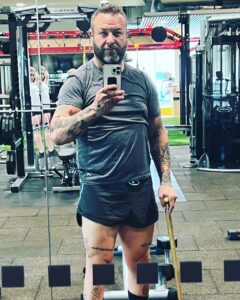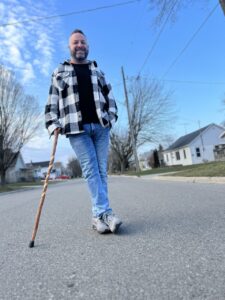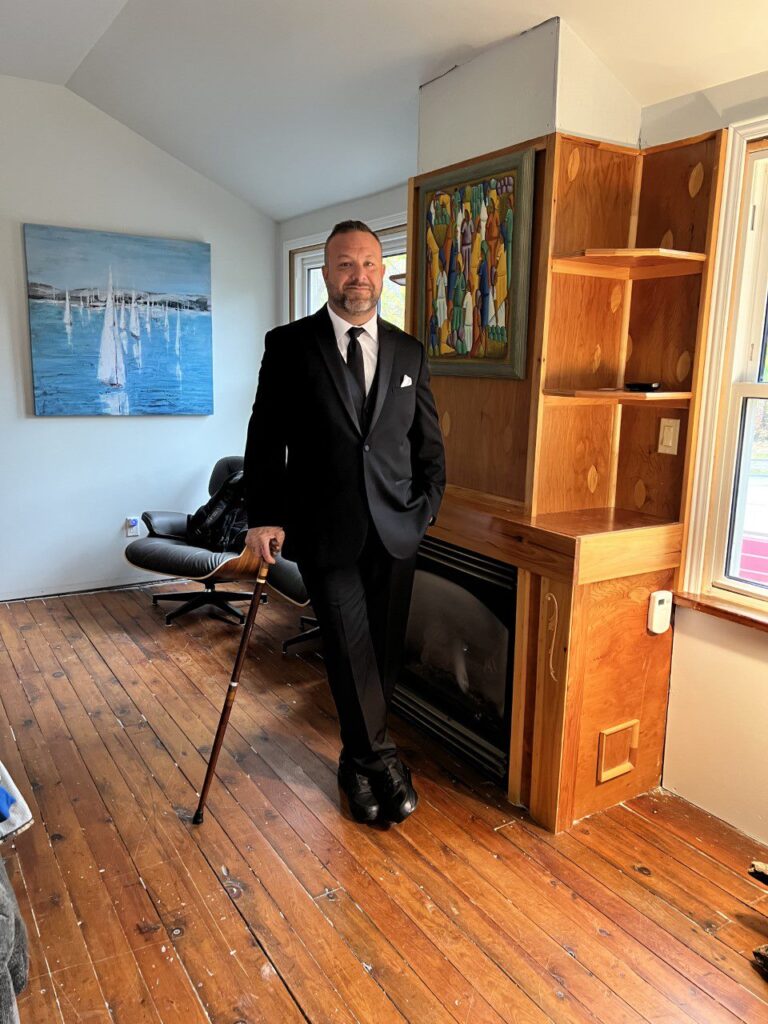Dustin Gawne is a 39 year old father of two from Ridgetown, Ontario whose story of overcoming addiction while adjusting to living with a disability is both gripping and uplifting. Prior to a single vehicle collision seven years ago, where he sustained his incomplete SCI, he remembers being the party guy; the person everyone would go to for a good time. Alcohol, hard drugs and prescription pills crept into his routine, making them difficult to escape as a downward spiral began. Today, his new perspective on life and love of sport is largely responsible for his four years of sobriety – but the journey was far from easy.
In his initial transition to SCI, Dustin spent time in the hospital and experienced a period of intense struggle. “I just tried to figure out ‘why me?’ I went down a path of feeling sorry for myself and trying to get others to feel sorry for me too,” he shares. Upon re-entering the community, he moved into his own apartment, where his addiction intensified along with his mental health. He used a wheelchair for the first bit of his journey, and three years post-injury, he overdosed, was arrested and had his home raided. “The first thing I woke up to after my OD were pictures of my nieces and kids.” says Dustin.
In 2018, Dustin’s path would drastically begin to shift. His addiction, amplified by a new disability had made him unrecognizable to people in his community. “We are from a little community called Ridgetown and my doctor’s wife had known me since I was young. She saw the state I was in and genuinely became scared,” shares Dustin. “She got me to see a doctor, her husband immediately. To be cared for in such a way after years in between, it made me feel seen. And that was a massive turning point.”
At his doctor’s visit, things were bleak, but sincere. “He simply looked me in the eyes and said ‘I am here to help you live life. But I am not here to help you die. You are taking up valuable space and you need to want to get better.'” That was in July of 2018. By mid-August, Dustin had sobered up and put his all into healing and growth. Still, it wasn’t until COVID hit that he discovered the power of movement.
“When you’re trying to get your head around SCI, addiction and everything else, it was really the worst thing I ever experienced. I didn’t understand SCI. but it sets the tone for the rest of your life. During COVID, I looked in the mirror and realized I was overweight. I didn’t like how I looked so I started working out again,” he shares.
Dustin began testing the limits of his body and was able to get his knees up to his chest, which had been difficult to achieve for years. It improved his mental health immensely. “I was still very broken, but I was breaking barriers,” says Dustin.
In the midst of the pandemic, Dustin achieved thousands of kilometers, swimming across bodies of water close to home. He also got a bicycle, which changed his life significantly. “I was able to go places my legs couldn’t take me anymore. I biked to places and that was the moment my mental health really checked in.”

Today, Dustin walks around with a cane. Although he still experiences challenges from living with an SCI, he long distance bikes and continues to raise awareness of addiction and mental health by sharing his story with others. “The moment I started speaking out about it, people started reaching out and I was blown away. I was able to help others, too.”
Dustin shares that he did not have peer support throughout his journey and did not know anyone else with an SCI. “I was in rough shape at the time, and I wasn’t in a place to be introduced to others,” he shares, “But it would be interesting to compare notes with others on how to handle SCI because there are tons of things to figure out.” Just last year, Dustin experienced third degree burns from a heated car seat, which deeply affected his mental health. “There are days where I still struggle for sure,” he shares. 
Today, Dustin is training to bike across Canada this summer to bring awareness to addiction, mental health and SCI. “I have a team coming with me, and if I get to the starting line, I’ve already won,” he says. He hopes to one day build a foundation, but is firm on not making plans for the future, and focusing instead on his day to day journey and seeing what will unfold following this summer.
“Reach out to others if you’re struggling,” he says, “Talk to everybody. Don’t try to figure it out on your own. Family and loves ones are going through it with you. Stay connected. Never fall out; everybody needs support. The best thing I’ve done is choosing to live.”






